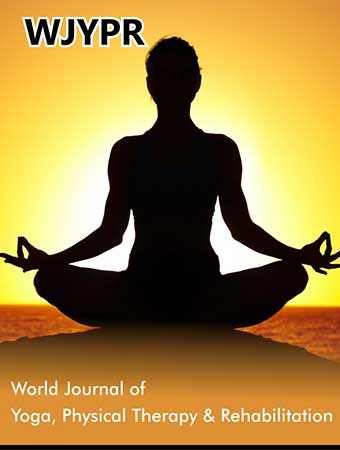 Mini Review
Mini Review
The Impact of Yoga on Stress in College Students
Zachary Townsend, School of Health Sciences, USA.
Received Date: September 27, 2019; Published Date: October 22, 2019
Keywords: Yoga; Stress; College students
Abbreviations: MEMT: Mastering Emotions Technique; ERQ: Emotional Regulation Questionnaire; PANAS: Positive and Negative Affect Schedule; SCS: Self-Compassion Scale; MAAS: Mindful Attention Awareness Scale; BAI: Beck Anxiety Inventory; PSS: Perceived Stress Scale; FFMQ: Five Facet Mindfulness Questionnaire
Introduction
According to data from the Center for Collegiate Mental Health [1], 61.8% of college students seeking counseling reported anxiety, 49.8% reported depression, and 43.9% reported stress [1]. High levels of stress have been linked to serious health risks such as suppressed immune functioning, cardiovascular disease, and gastrointestinal complications [2]. College students are exposed to many stressors such as academic, social, and financial demands. Due to these stressful demands, many students resort to selfmedicating with heavy episodic alcohol consumption [3]. However, research indicates healthy behaviors, such as physical activity and yoga practice, may be used to reduce stress and anxiety levels. Thus, the purpose of this mini-review is to evaluate three studies investigating the impact of yoga on stress in college students.
Discussion
A pilot study conducted by Gaskins RB, et al. [4] investigated the effects of Vinyasa yoga on affect and stress in college students [4]. Participants (N=20) ≥18 years old attended a Vinyasa yoga class twice per week for 8 weeks (16 total sessions). Researchers measured affect and stress, using the Positive and Negative Affective Schedule and the Cohen Perceived Stress scale, before and after each yoga session. Positive affect scores significantly increased during 14 sessions, while negative affect scores significantly decreased during 15 sessions (p < 0.05). Repeated measures ANOVAs indicated significant changes in pre-post affect scores; however, there was no significant change in stress scores. These results indicate participation in Vinyasa yoga may improve affect in college students. Consequently, regular yoga participation may help decrease anxiety and depression in this population.
Yoga practice consists of multiple techniques. In addition to Vinyasa yoga, the Mastering Emotions Technique (MEMT) is a meditation style yoga. Patel, Nivethitha, and Mooventhan (2018) investigated the effects of a yoga meditation technique on emotional regulation, self-compassion, and mindfulness in college students [5]. Participants (N=72) aged 18-25 years old practiced MEMT for 45 minutes per day during 2 weeks. Researchers utilized a pre-post study design and recorded measurements using the Emotional Regulation Questionnaire (ERQ), The Positive and Negative Affect Schedule (PANAS), Self-Compassion Scale (SCS), and Mindful Attention Awareness Scale (MAAS). Wilcoxon signed ranks testing (p < 0.05) indicated significant increases in cognitive reappraisal, positive affect, self-compassion, and MAAS. In addition, there were significant decreases in negative affect and expressive suppression. This study provides evidence meditation style yoga may improve emotional wellness in college students; however, the lack of a control group is one apparent limitation in this study design. A randomized controlled trial design, comparing yoga treatment with a control group, would help provide more substantial evidence to support yoga practice in this population.
Lemay, et al. [6] investigated the impact of a 6 week yoga and meditation intervention on college students’ stress and anxiety levels [6]. Students (N=17) aged 19-23 years participated in a 60-minute Vinyasa Flow yoga class once per week followed by guided meditation. Stress levels, anxiety levels, and mindfulness skills were assessed pre and post intervention using the Beck Anxiety Inventory (BAI), the Perceived Stress Scale (PSS), and the Five Facet Mindfulness Questionnaire (FFMQ). Wilcoxon signed ranks testing indicated significant decreases in anxiety and stress scores, with significant increases in total mindfulness. This pilot study provides evidence participating in yoga and meditation, as little as once per week, may contribute to decreases in anxiety and stress among college students. Two limitations of this study were the lack of a randomized control group and small sample size.
Conclusion
In conclusion, these 3 studies provide evidence to support the inclusion of yoga and meditation practice among college students in order to improve emotional wellness and decrease stress and anxiety. Future studies should incorporate randomized controlled trial designs and larger sample sizes. In addition, comparing the effects of different yoga practices may be one area of future interest. Transitioning into college life is a stressful time for many young adults. Practicing yoga and mindfulness may be one healthy strategy to help alleviate some of the potential stressors in this population.
Acknowledgment
None.
Conflict of Interest
No conflict of interest.
References
- Center for Collegiate Mental Health (2019) 2018 Annual Report (Publication No. STA 19-180), USA.
- Yaribeygi H, Panahi Y, Sahraei H, Johnston TP, Sahebkar A (2017) The impact of stress on body function: A review. EXCLI J 16: 1057-1072.
- Metzger IW, Blevins C, Calhoun CD, Ritchwood TD, Gilmore AK, et al. (2017) An examination of the impact of maladaptive coping on the association between stressor type and alcohol use in college. J Am Coll Health 65(8): 534-541.
- Gaskins RB, Jennings E, Thind H, Becker BM, Bock BC (2014) Acute and cumulative effects of vinyasa yoga on affect and stress among college students participating in an eight-week yoga program: A pilot study Int J Yoga Therap 24: 63-70.
- Patel NK, Nivethitha L, Mooventhan A (2018) Effect of a yoga based meditation technique on emotional regulation, self-compassion and mindfulness in college students. Explore (NY) 14(6): 443-447.
- Lemay V, Hoolahan J, Buchanan A (2019) Impact of a yoga and meditation intervention on students' stress and anxiety levels. Am J Pharm Educ 83(5): 7001.
-
Zachary Townsend. The Impact of Yoga on Stress in College Students. W J Yoga Phys Ther & Rehabil 1(3): 2019. WJYPR.MS.ID.000515.
-
Yoga, Stress, College Students, Mental health, Depression, Cardiovascular disease, Gastrointestinal, Physical activity, Meditation, Mindfulness, Anxiety
-

This work is licensed under a Creative Commons Attribution-NonCommercial 4.0 International License.






